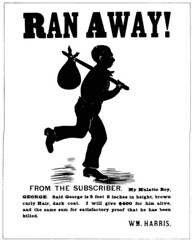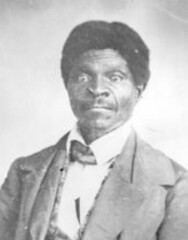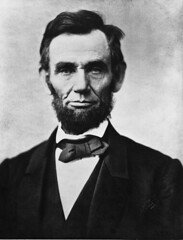CIVIL WAR
4L History/Geography-Civil War Study Guide
Matching-Politicians, Legislation, Government, etc.
-Missouri Compromise (where could slavery not extend to)
-Fugitive Slave Act (what did it say? Compromise of 1850)
-Popular Sovereignty (what does this mean)
-Dred Scott (why was he suing for freedom?)
-Uncle Tom's Cabin (what is this?)
-South Carolina (what did the state do in December 1860?)
-Secessionists (what did these people believe?)
-Jefferson Davis (who was he?)
-Abraham Lincoln (role in government)
-War of Attrition (what is this?)
-Cotton (importance to the Southern economy)
-Gettysburg Address (purpose of the speech)
-Emancipation Proclamation (what did this turn the civil war into?)
-Total War (definition)
-13th Amendment (what did this amendment do?)
Matching-Battles, Generals, Cities, etc.
-Ft. Sumter (date/importance of battle)
-Bull Run (date/what did citizens expect at the battle?)
-Stonewall Jackson (position in the Confederate army/when did he die?)
-Robert E. Lee (position in the Confederate army)
-Ulysses S. Grant (position in the Union army)
-William Sherman (what did he bring to S.C. and G.A.?)
-Mississippi River (importance to each side)
-Shiloh (date/importance of battle to Union)
-Antietam (date/importance of battle)
-54th Massachusetts (led attacks at which battle?)
-James Longstreet (position in Confederate army)
-Richmond, VA (importance to the Confederacy)
-Chancellorsville (date/importance of battle to Lee)
-Gettysburg (date/importance)
-Vicksburg (what happened during the siege?)
-Appomattox Court House (importance of town)
Short Answer (answer all questions)
-Who exactly did the Emancipation Proclamation free? Why didn't Lincoln free slaves in all the states?
-Explain the positive good theory of slavery. Do you agree with this theory? Why or why not?
-Give one reason why most southerners were upset about Lincoln's election in 1860.
-List two advantages of the Union and two advantages of the Confederacy during the war.
-Give one reason why Robert E. Lee invaded the North multiple times during the Civil War (do not say "to win the war").
-True or false and explain your answer. Abraham Lincoln was an abolitionist.
-Define total war and discuss whether you agree with this concept. Use specific details in your argument.
-List and explain two causes of the Civil War.
| 5562233524 | Fugitive Slave Act | One part of the Compromise of 1850, this law stated that escaped slaves must be returned to masters even if they were in the North, and set harsh punishments for those assisting runaway slaves. |  | 0 |
| 5562233525 | Popular Sovereignty | Let the people decide by State, on whether slavery should be allowed in territories through voting. |  | 1 |
| 5562233526 | Dred Scott | He was a slave who was taken to free territory. He sued for his freedom and the Supreme Court declared that slaves are property, not people. |  | 2 |
| 5562233530 | Abraham Lincoln | President of the U.S., 1861-1865 |  | 3 |
| 5562233531 | Cotton | number 1 Cash Crop in the South in the 1800's. |  | 4 |
| 5562233535 | Compromise of 1850 | Law passed that gave North and South part of what they wanted. California admitted as free state, slave trade abolished in DC, and new fugitive slave law passed; advocated by Henry Clay and Stephen A. Douglas |  | 5 |
| 5562233536 | Underground railroad | 1830, Harriet Tubman, a system that helped enslaved African Americans follow a network of escape routes out of the South to freedom in the North, went all the way to Canada |  | 6 |
| 5562233537 | Kansas-Nebraska Act | 1854 - Douglas: Created Nebraska (north) and Kansas (south) as states and gave the people in those territories the right to chose to be a free or slave state through popular sovereignty. North disliked the Act and Southerners loved it. |  | 7 |
| 5562233538 | John Brown | Abolitionist involved in violence in Kansas. In 1859, he led a raid of a government arsenal at Harper's Ferry, Virginia, with the intention of arming slaves and starting a revolt. He became a hero of the abolitionists in the Civil War. Brown was considered a matryr by some and a madman by others. |  | 8 |
| 5562233539 | Election of 1860 | Abraham Lincoln, the Republican candidate, won because the Democratic party in the South was split over slavery. As a result, the South no longer felt like it had a voice in politics and a 11 states seceded from the Union. |  | 9 |
| 5562233540 | Harriet Beacher Stowe | The author of the book Uncle Toms Cabin that persuaded people to want to end slavery. |  | 10 |
| 5562233546 | sectionalism | People aligning themselves more with the region of the country they live in rather than the nation as a whole. |  | 11 |
| 5562233548 | Republican Party | Political party formed in 1854. Its main goal was to stop the spread of slavery. |  | 12 |
| 5562233550 | "Bleeding Kansas" | (1856) a series of violent fights between pro-slavery and anti-slavery forces in Kansas who had moved to Kansas to try to influence the decision of whether or not Kansas would a slave state or a free state. | 13 | |
| 5562233552 | Harper's Ferry | John Brown's scheme to invade the South with armed slaves, backed by sponsoring, northern abolitionists; seized the federal arsenal; Brown and remnants were caught by Robert E. Lee and the US Marines; Brown was hanged |  | 14 |
| 5562242032 | Nat turner rebellion | Nat Turner, and overseer, minister, and slave, had a divine call and revolted, killing families of masters and 35 more whites, Turner and 16 others slaves were hanged; results: stricter laws, creative ways to defend slavery, new period of abolition | 15 | |
| 5562247666 | missouri compromise | "Compromise of 1820" over the issue of slavery in Missouri. It was decided Missouri entered as a slave state and Maine entered as a free state and all states North of the 36th parallel were free states and all South were slave states. | 16 | |
| 5562251137 | uncle tom's cabin | written by harriet beecher stowe in 1853 that highly influenced england's view on the American Deep South and slavery. a novel promoting abolition. intensified sectional conflict. | 17 | |
| 5562253761 | fugitive slave act | A law that made it a crime to help runaway slaves; allowed for the arrest of escaped slaves in areas where slavery was illegal and required their return to slaveholders | 18 | |
| 5562256171 | abolitionists | people who believed that slavery should be against the law | 19 | |
| 5562260278 | california gold rush | 1849 (San Francisco 49ers) Gold discovered in California attracted a rush of people all over the country and world to San Francisco; arrival of the Chinese; increased pressure on fed gov. to establish a stable gov. in CA | 20 | |
| 5562260279 | mexican cession | 1848. Awarded as part of the Treaty of Guadalupe-Hidalgo after the Mexican American War. U.S. paid $15 million for 525,000 square miles. | 21 | |
| 5562262636 | manifest destiny | A notion held by a nineteenth-century Americans that the United States was destined to rule the continent, from the Atlantic the Pacific. | 22 | |
| 5562265162 | annexation of texas | 1845-Texas seceded from Mexico and declared independence in response to Mexican abolition of slavery. US adopts/annexes Texas because Southern states support Texas slavery. The North feared expansion of slavery and war with Mexico (see Mexican American War) | 23 | |
| 5562268337 | nativism | A policy of favoring native-born individuals over foreign-born ones | 24 | |
| 5562270465 | antebellum | before the war | 25 | |
| 5562273081 | causes of the civil war | Economic and social differences between the North and the South, having states vs. federal rights, slaves vs. non-slave proponents, the Growth of abolitionist movement and the election of President Abraham Lincoln. | 26 |

